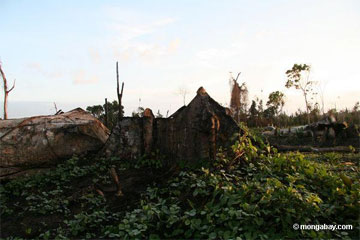Illegal timber from Honduras reaching the United States
mongabay.com
November 4, 2005
U.S. companies, including Home Depot, are unknowingly importing illegal Honduran wood, contributing to deforestation, corruption and poverty in the Latin American country, according to a yearlong undercover investigation by the Center for International Policy and the Environmental Investigation Agency (EIA).
Authors of report, titled “The Illegal Logging Crisis in Honduras,” say that officials in Honduras regulate and collect taxes on only a fraction of timber exports leaving U.S. consumers no way of knowing that they are buying illegally harvested wood.
“At this point, it is very difficult for the consumer to identify what they’re buying,” said Allan Thornton, president of EIA. “It’s extremely difficult for anyone to say with certainty that any wood product coming from Honduras originated from legal timber because there’s so much illegal logs and illegal timber circulating internally into the chain of supply.”
The investigation found that forestry-related corruption in Honduras is prevalent and extensive, involving politicians, bureaucrats, timber companies, mayors, police and other officials. Further, illegal timber harvesting is contributing to deforestation in Honduras, which currently tops 252,400 acres (102,200 hectares) per year. Fuelwood collection, clearing for cattle pasture, and commercial and subsistence agriculture also play significant roles in forest loss.
The report comes as relations between loggers and ecologists have become increasingly tense. According to The Associated Press, last year President Ricardo Maduro sent in troops to help quell conflicts between loggers and environmentalists in south-central Honduras. Earlier, three members of the Movement of Olancho, an environmental group that has fought illegal loggers, were shot and killed. The leader of the group, Father José Andrés Tamayo Cortez, was awarded the 2005 Goldman Environmental Prize — a prestigious award that recognizes individuals for sustained and significant efforts to preserve and enhance the natural environment — for his efforts.
 Pictures of Honduras |
In the new report, Father Tamayo calls on the United States to help combat the illegal trade in Honduran timber.
“In light of these shameful acts,” says Father Tamayo, “We ask for the solidarity, support, and protection of the authorities, organizations and the good people of the United States of America to help our environmental leaders and the community that defends the rights of the people.”
The report details steps that must be taken in the US to stop the trade in illegal wood:
- Retailers, like Home Depot must follow their own internal guidelines and refuse to buy timber from these illegal loggers;
- The Bush Administration must act on its many unfulfilled prior commitments to clamp down on illegal timber imports from Central America;
- The U.S. government must act to stop the flood of cheap, illegal wood from Honduras by supporting the listing of Honduran Pine on Appendix 3 of the Convention on International Trade in Endangered Species Agreements (CITES) with a strict export quota limited to verifiably legal wood
- The U.S. must also link debt aid with a requirement that the Honduras Government guarantee its citizens’ freedom from the constant death threats intended to destroy the anti-illegal logging movement.
The report, which also includes an index of major U.S. importers of Honduran wood, can be found at http://ciponline.org/central_america/index.htm.
|
Related articles: The Next Costa Rica? Environmental activism takes root in Honduras – November 4, 2005 Honduran priest recognized as environmental hero with $125,000 award – April 22, 2005 |
The Center for International Policy
The Center for International Policy (www.ciponline.org), founded in 1975, promotes a U.S. foreign policy based on international cooperation, demilitarization and respect for basic human rights. It is cooperating with “Democracy without Borders,” CIP’s Honduras-based international NGO, in a campaign to save the forests of Honduras and encourage political reform
The Environmental Investigation Agency
The Environmental Investigation Agency (www.eia-international.org) is a non profit group dedicated to fighting and exposing environmental crime. EIA, with offices in Washington DC and London, UK works to support and develop the capacity of local groups and enforcement authorities around the world to enact practical solutions to environmental crimes.
This report used information from the Associated Press and “The Illegal Logging Crisis in Honduras,” a new report from the Center for International Policy and the Environmental Investigation Agency.